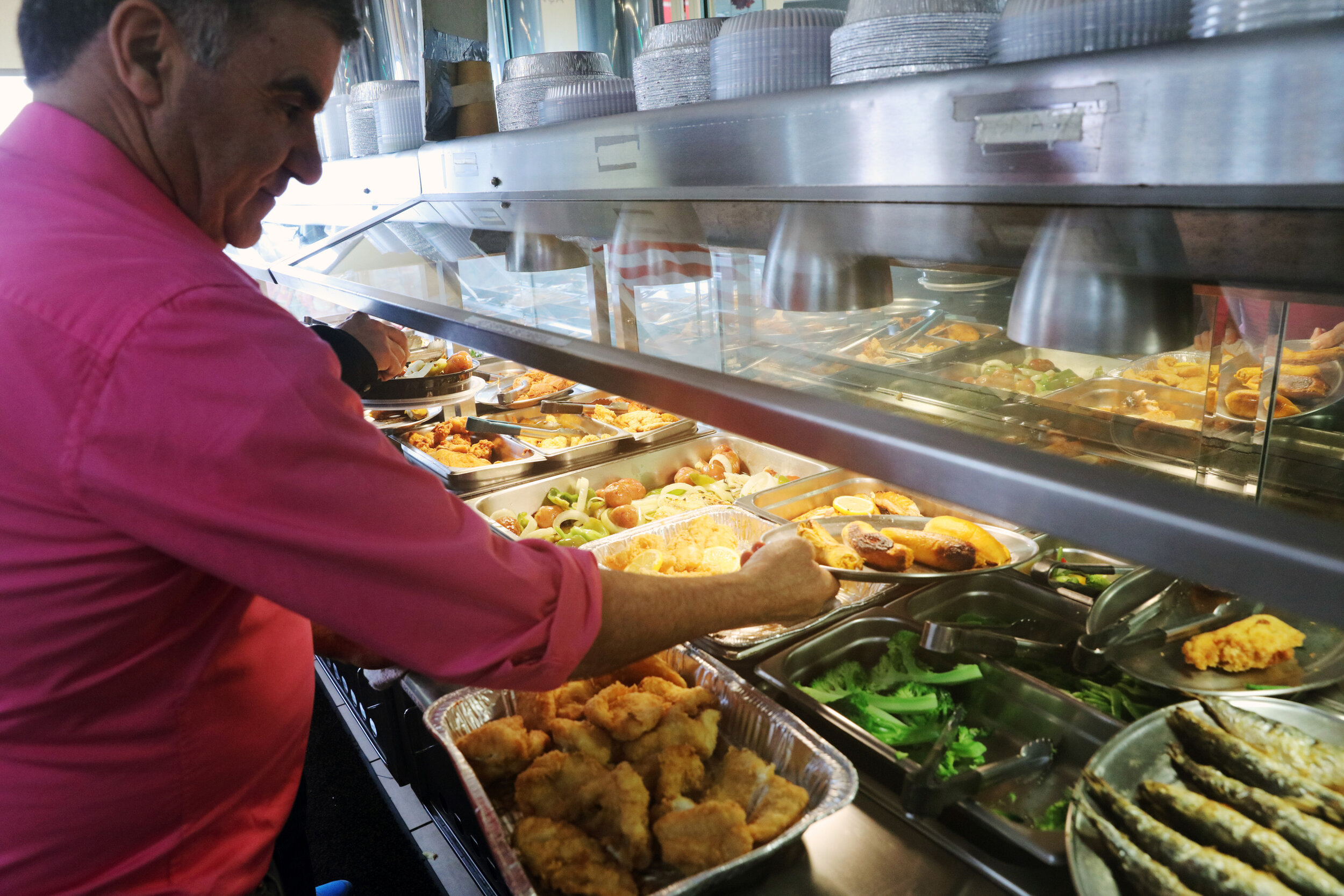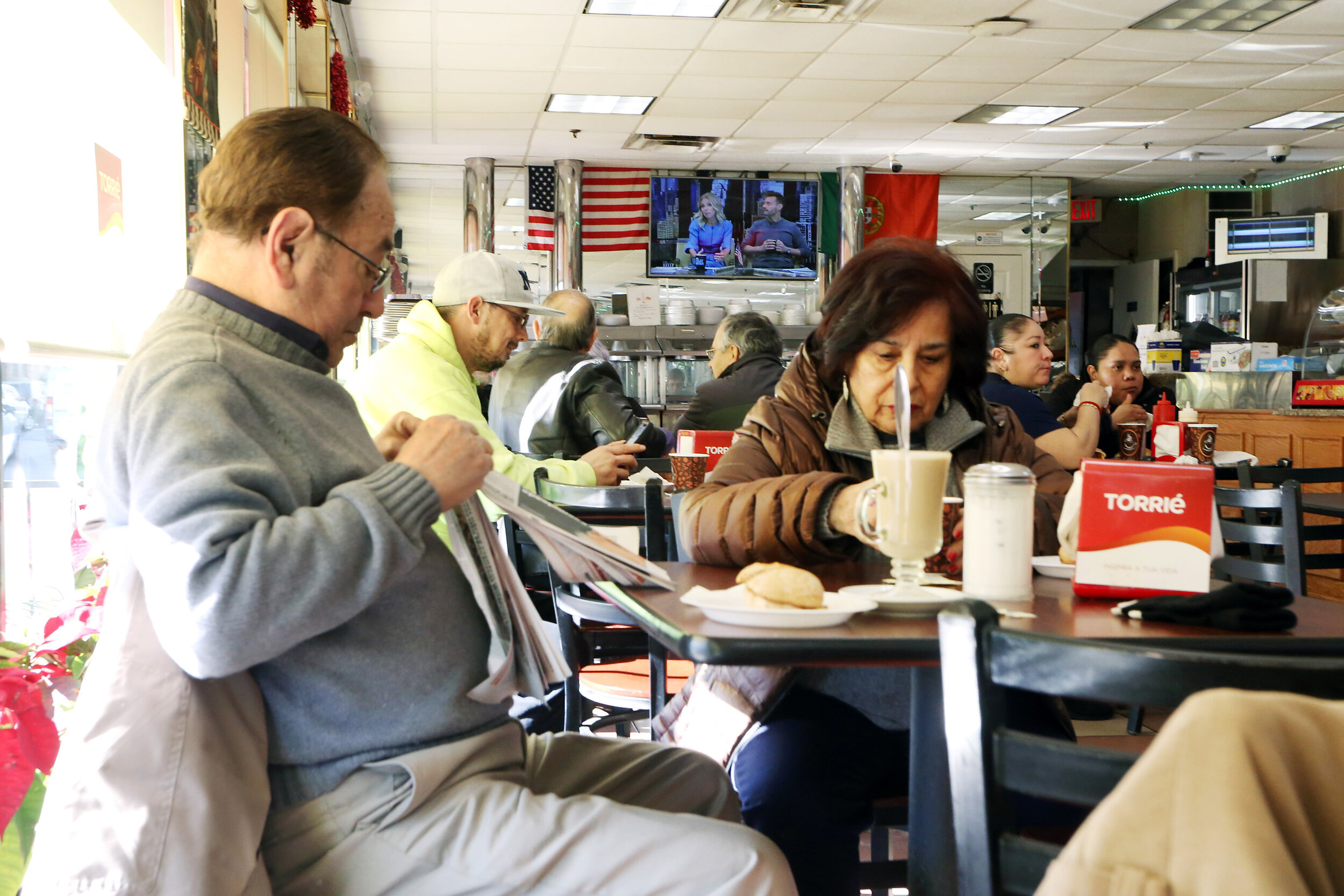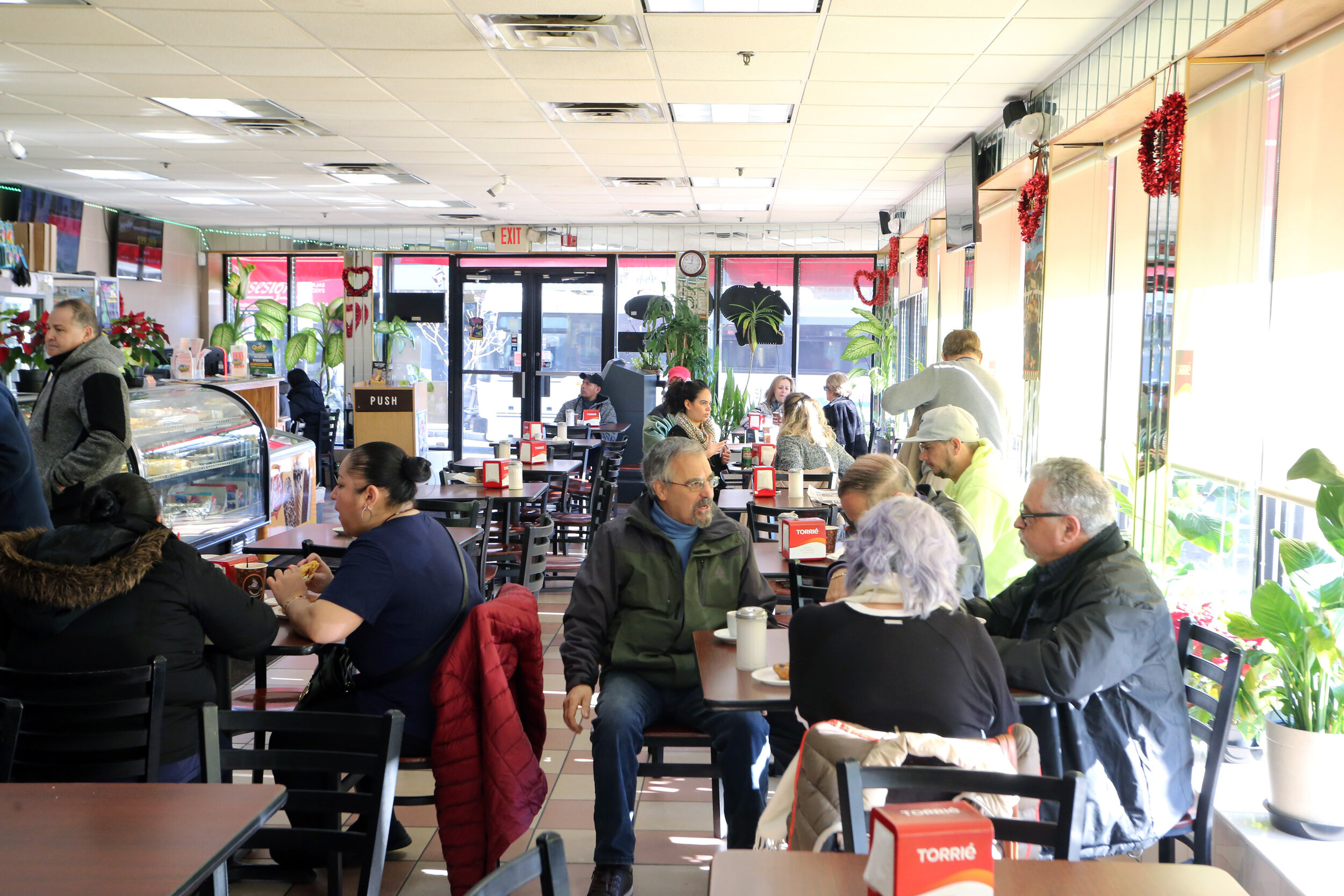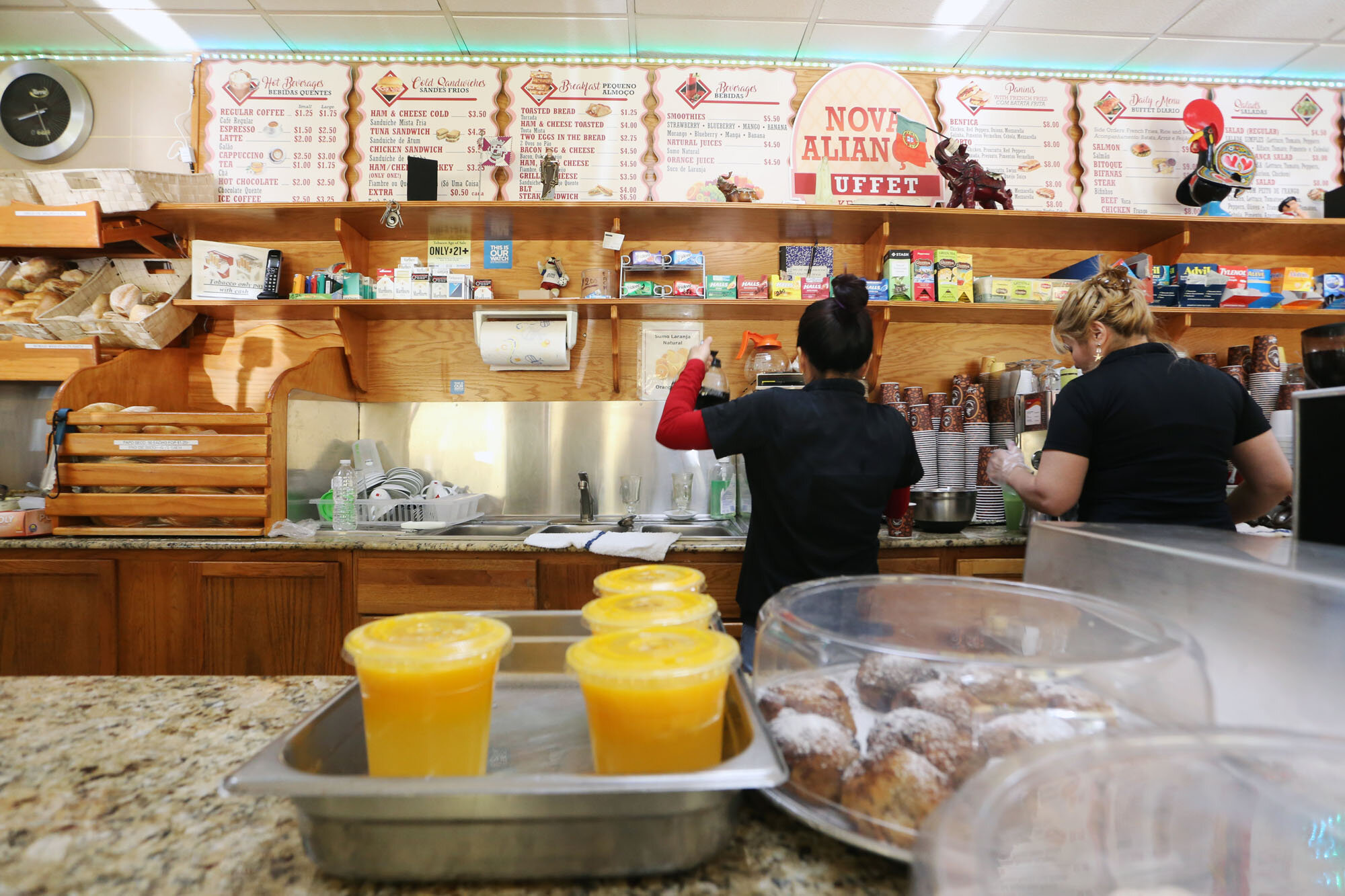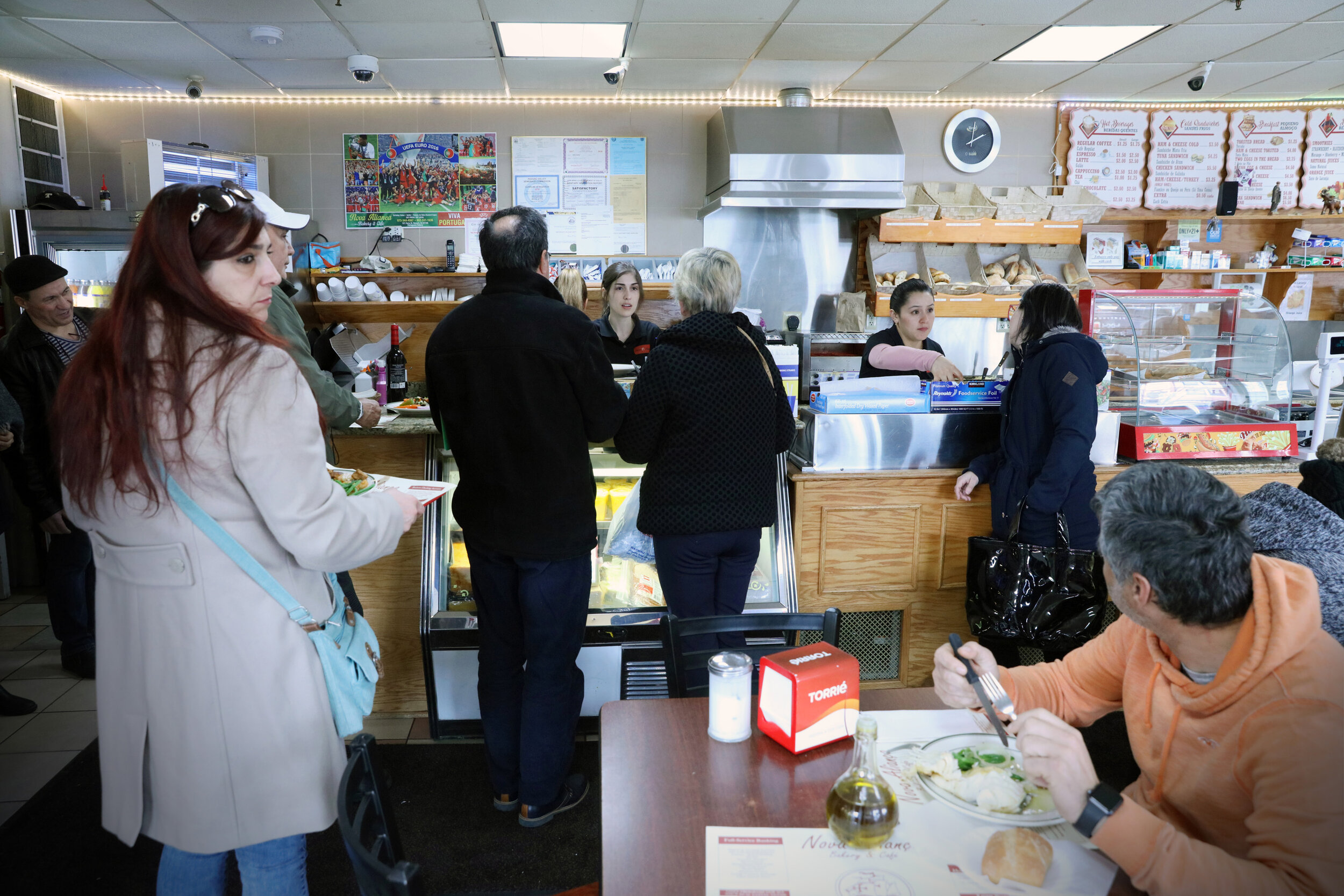A distinctive feature of the foodscape of Newark’s Ferry Street are the ubiquitous cafe-bakeries serving Portuguese pastries rarely found in the region outside the Ironbound. Teixeira’s, with its relatively new building and legendary Pasteis de Nata is the best known, but the neighborhood is dotted with others that cater to the local Portuguese community. Unlike Teixeira’s, which primarily serves a take-out crowd from far and wide, Nova Aliança is a local joint, a place for conversation, conviviality, community; an ideal spot from which to observe neighborhood traditions and transitions.
Portuguese immigrants began arriving in Newark at the beginning of the 20th Century and their numbers in Ironbound rose sharply after the Second World War. By the 1970s, in the wake of Portugal’s “flower revolution” that ended the half century reign of dictator Antonio Salazar, the Portuguese were the largest ethnic group in the neighborhood, and Ironbound was a thriving center of Portuguese diaspora in the United States. The neighborhood became known as Little Portugal. Big Portugal took notice and the Portuguese government established a consulate in Newark.
Since the 1970s, however, the demographic makeup of the United States has changed dramatically. The 1965 Immigration and Naturalization Act made it possible for a much more globally diverse population to immigrate to the United States. In Ironbound, these demographic changes manifested in a sharp rise in Latin American residents. While the alternative name of Ferry Street — Portugal Avenue — is still emblazoned on street signs, many second-generation Portuguese have left the neighborhood, opening space for the arrival of other newcomers from Latin America. Spanish speakers now outnumber the Portuguese; a development that elicits mixed emotions in the neighborhood.
The demographic shift is a topic of much discussion these days in Ironbound. Several older Portuguese whom we interviewed for this project expressed a sense of loss, and nostalgia for a time when their language and culture was the dominant presence in the neighborhood. As the Portuguese population in Ironbound dwindles, places like Nova Aliança keep those who left the neighborhood connected to those who remained, and provide them both with the Portuguese food, rituals, and sociability that define their community in diaspora. Many of the senior citizens who hang out in the Nova Aliança bakery — sipping bicas, nibbling pasteis de nata, sampling the lunch buffet, swapping stories and gossip — are first-generation Portuguese, for whom Ironbound provided their first and last refuge in the United States. Places like Nova Aliança are where, over several decades, they have recreated the relationships and social life from “back home” that are renewed every time they gather in the bakery.
The building & its history
Nova Aliança is perched on the corner of Madison and Ferry Streets, halfway between Penn Station and St. Stephan's Church.
It occupies the first floor of a three-story brick building built in the late 19th century. In the 1870s, German immigrants had built a church on that site and a school to serve what was then the largest immigrant community in the neighborhood. By 1889, although the property at 121 Ferry street remained in the hands of the German immigrant Edward Eckert, the church had been razed and a 3-story brick building erected in its front courtyard.
The Germans in Ironbound would migrate to the suburbs with the Irish and Italians in the 1950s and 60s, but many of their buildings remain. The Lutheran church they built in 1876 at the apex of Ferry Street, where five roads merge, still holds pride of place at the center of the neighborhood. Today its Brazilian pastor ministers to a congregation consisting primarily of Brazilians and other Latin Americans. But the building constructed in the 1880s at 121 Ferry remains, and with only incremental modifications has hosted successive waves of immigrants selling dry goods, refrigerators, kitchen furniture and auto parts.
Before Nova Aliança planted the Portuguese flag at 121 Ferry, the Spanish-owned Gonzales Restaurant and Pasquale Dellasio’s Italian cooking had already made the building a site of Mediterranean smells and sustenance in the neighborhood. As with previous immigrant communities it was the arrival of Portuguese in greater numbers in the 1970s that created the demand for new restaurants serving food familiar to the new arrivals. Several of these restaurants, like Nova Aliança, have been around for more than four decades. So have some of the regulars, who use it as an informal social club.
On the first floor, the exterior of the cream brick building is marked by signs and an awning highlighting the bakery’s historical association with the Portuguese community in the Ironbound. The interior of the cafe displays few overt markers of ethnic identity apart from the Portuguese flag that hangs by the lunch buffet. However the colors, counters, tables, chairs, and social function are all reminiscent of bakery cafes in the Portuguese towns that the regulars are from.
While the regulars are a constant presence, the people who stop in for breakfast, lunch or a mid-afternoon coffee are as diverse as the neighborhood has become. Stop by for coffee in the morning and you might bump into the Guatemalan cook who works at the Brazilian restaurant around the corner, or the Ecuadorian guy, a construction helmet under his arm, flirting with the Salvadoran waitress, or the Brit down the block who converted the loft above his uncle’s transformer factory into a photo/video studio and event space. The full range of ethnic identities in Ironbound becomes apparent at lunch time, when Nova Aliança’s popular buffet of raw and steamed vegetables, grilled and fried fish and chicken attracts both locals and those who work in nearby businesses.
In addition to the Portuguese buffet, the menu includes diner style food options ranging from sandwiches and paninis to salads and omelets, and Portuguese specialties featuring bacalhau (cod fish) and a tasty Pasteis de Nata.
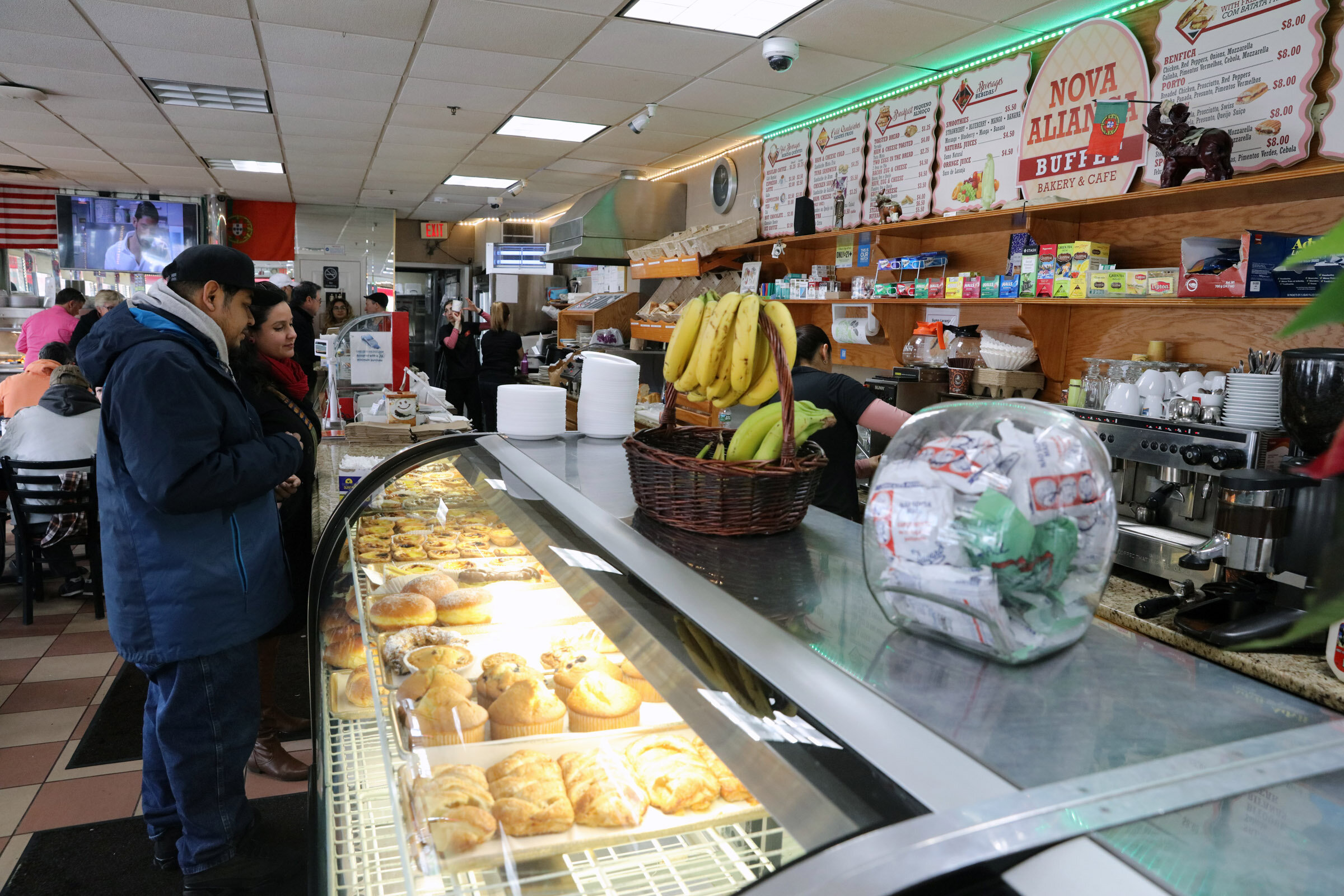
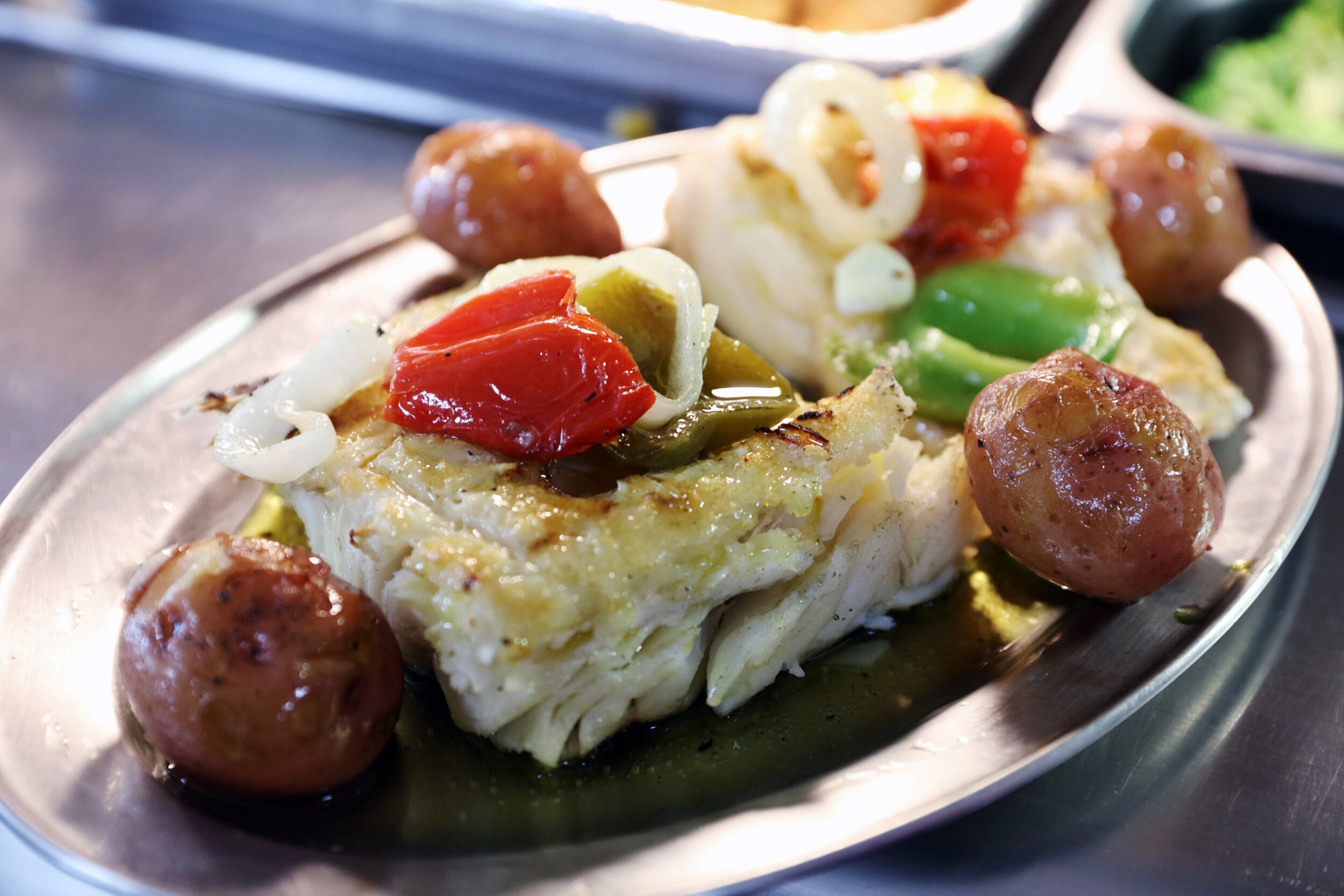
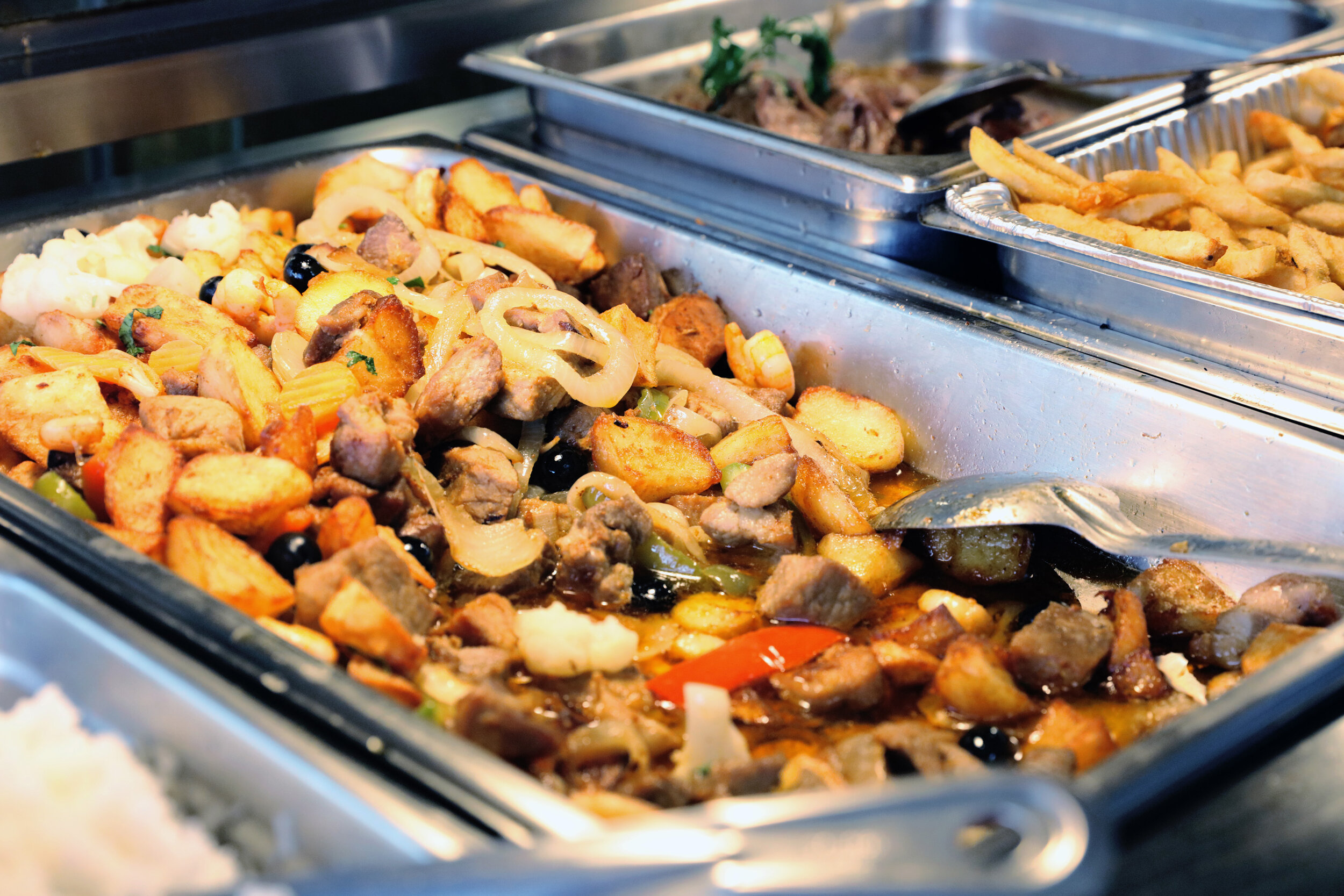
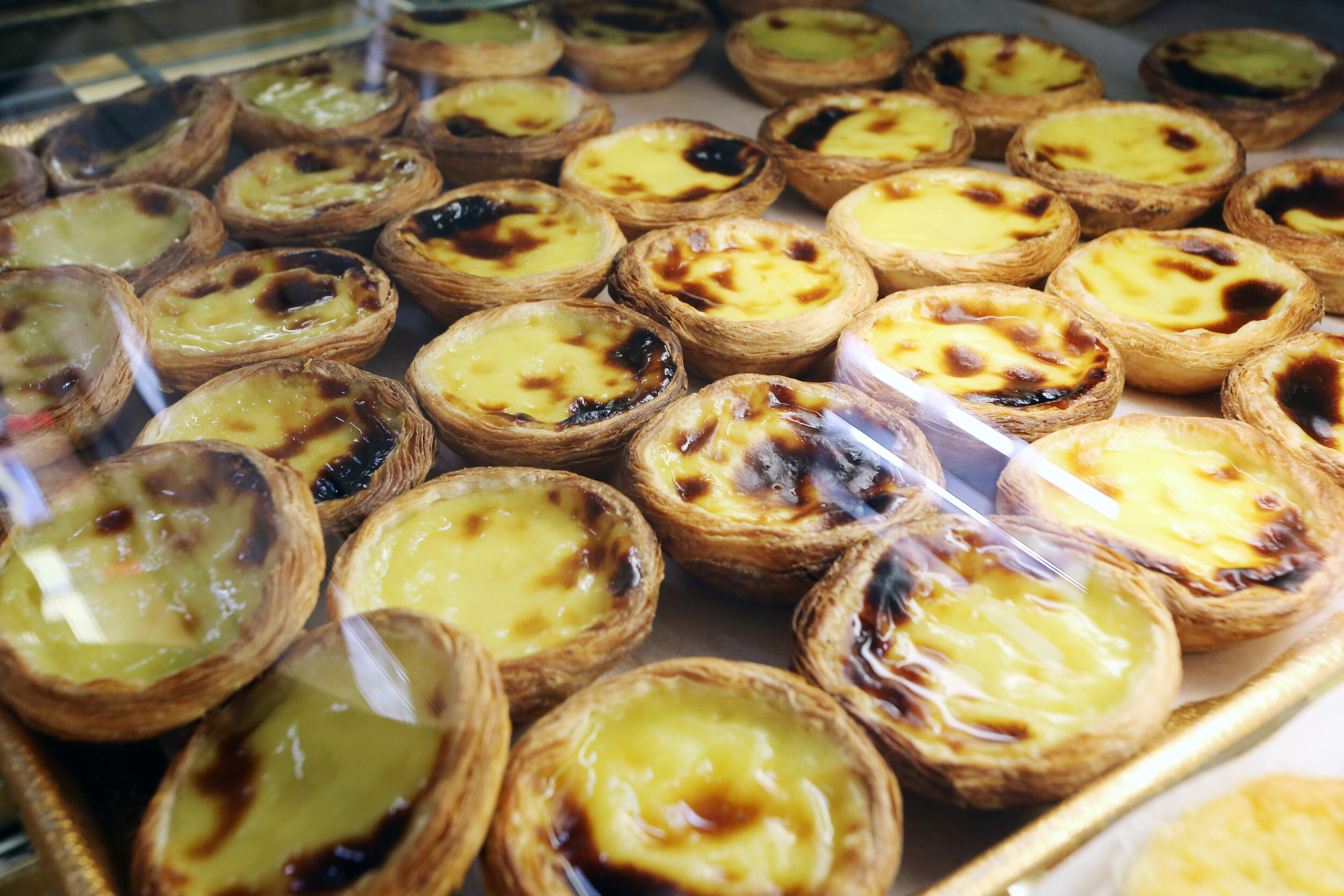
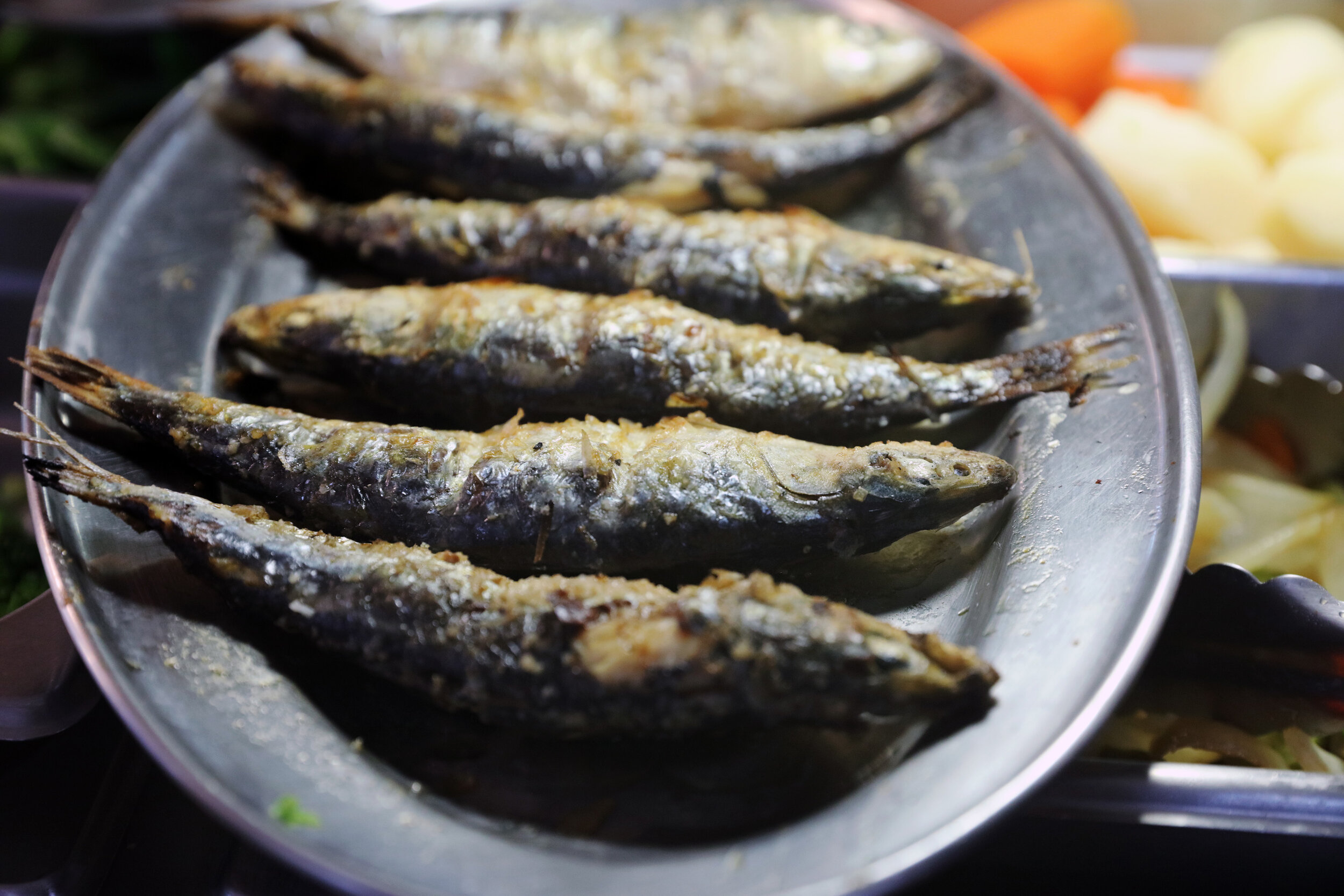
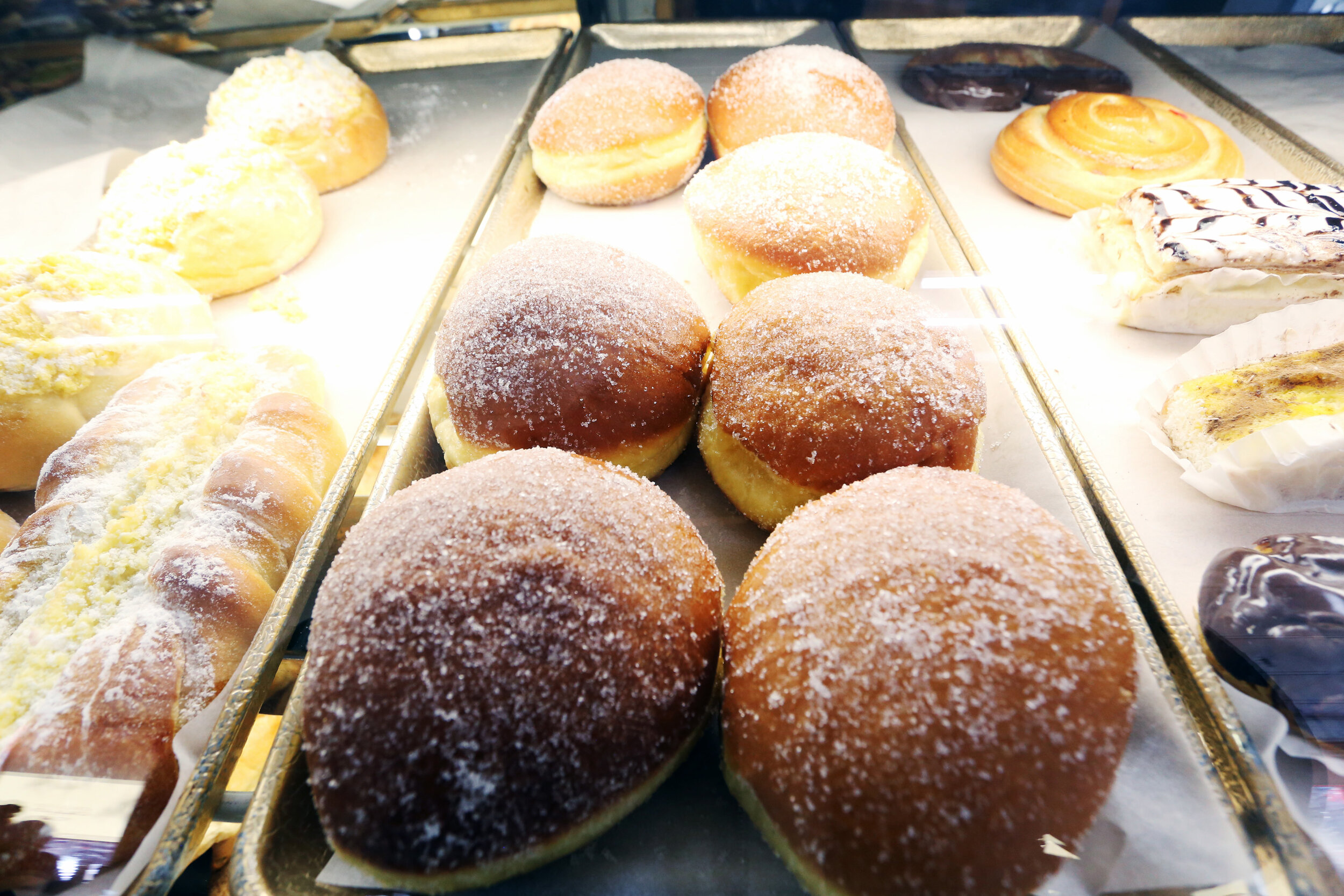
Similar to other bakeries and smaller restaurants and delis in the area, Nova Aliança has a counter service system. Upon entering, customers head to the counter to select their pastry or read the menu on the wall. During the busy breakfast and lunch rush hours a multi-ethnic clientele arrives in droves and finding a table can be a real challenge. Walking to the counter, customers pass through a soundscape that includes Portuguese, Spanish, English, and even Arabic. People's faces tell a similar story — one that testifies to the diversity of the people who live and work in the neighborhood.
A neighborhood in transition
Despite the different faces that come and go, a constant presence is groups of older patrons speaking Portuguese. In this hyper-diverse environment it is these regulars who preserve the Portuguese identity of the place. They often gather at tables located towards the front and near the window, interacting around and across the tables. Throughout the day they gather to read their Portuguese language newspapers, chat and gossip, discuss politics here and in Portugal, exchange the latest news from the neighborhood, and try their luck with the lottery tickets sold at the counter.
For the older Portuguese, Nova Aliança is reminiscent of the places back home in Portugal where people come to see friendly faces, hang out, and socialize. As the eyes of the neighborhood, the regulars keep tabs on and evaluate every customer who spends an extended amount of time in the bakery. They know the rules and logistics of the place and often help new customers find the key to the bathroom or pick food from the menu.
Sitting at the table behind us, Manuel has been living in the United States for 47 years. Thin and light-skinned, with a brown fedora covering his white-hair, Manuel arrived in the neighborhood in 1972, and has worked and lived in the area ever since. He remembers the time when an auto shop occupied the current site of the bakery. It was after its Italian owner sold it that the building was converted into Nova Aliança. Manuel is a regular. It’s where he comes to spend a little time after work to socialize and see some familiar faces. "Here, I have people to talk to. At home, I have a cat and a dog; I cannot speak with them," he explains with a laugh. His older friend is continuously distracted by other elderly customers as they come and go. "Already leaving?" he asks the guy at the next table who is folding up his newspaper. He speaks of the good old days, when Lucia, the former Portuguese manager, ran the cafe. His voice resonates with the pride of being Portuguese — knowing how to build and run a business.
At another table a guy with a white beard is sitting by the window in the sun, working on a scratch-off card. The memory of the Portuguese woman who won $50,000 a few years ago keeps him playing. “She was just there!", he tells us, pointing to an adjacent table. “She is very rich! She is a widower. She has four buildings, just one daughter, she has a house in Portugal, she has everything!”
Our newly made friends have mixed feelings about Portugal. The younger guy misses Portugal very much, while the older one complains about the wide-spread corruption there. However, both are proud Portuguese. Portugal connects them and differentiates them from the newcomers. “Now there are not many Portuguese people anymore. It used to have more. Now there are more Spanish," the older guy exclaims. He is distressed to see a similar trend in Pao da Terra, another cafe bakery just a block away.
This is a sentiment shared by most of the older Portuguese residents we met at Nova Aliança. Matilde, who is in her 70s, expressed similar regrets. In 1958, Matilde and her family crossed the Atlantic from Portugal to the United States by boat. She got married and raised her sons, all in their 50s, in the neighborhood. She is a regular at the restaurant. She is unhappy about the new girls behind the counter, none of whom are Portuguese. Ala, a Brazilian girl who speaks Portuguese, only works part-time. Matilde points to one of the girls behind the counter, shakes her head, and exclaims: “She only speaks Spanish. Only Spanish. Not even English," and continues shaking her head in disapproval.
The Portuguese we spoke with ranged from mildly disgruntled to not-very-pleased by the changing demographics and landscape of the neighborhood. One was quick to inform us that “the neighborhood was different then, now it is all immigrants.” That the statement was uttered and received without any sense of irony is perhaps unsurprising. Immigrant amnesia and selective memory of an immigrant past is as American as apple pie. Or the Statue of Liberty, that French immigrant immortalized by poet Emma Lazarus as “A mighty woman with a torch, whose flame/ Is the Imprisoned lightning, and her name/ Mother of Exiles.” Lazarus’s Portuguese American roots run deep. The United States was still a British colony when her Portuguese ancestors settled in Manhattan. In addition to writing poetry, Lazarus advocated tirelessly for immigrants and worked with Jewish refugees on Ward’s Island. But these are troubled times. Lifting torches for the homeless, the tempest-tossed, or any other huddled masses yearning to breathe free can be dangerous when your government is rounding up immigrants and building walls around the golden door.
Newark is theoretically a sanctuary city, but many immigrants in Ironbound have reason to be concerned about shifting federal definitions of citizenship, immigration status, and immigrant rights. ICE is on the prowl and the subject of conversation throughout the neighborhood. The Portuguese do not identify as immigrants — at least not anymore. Not now. Ironbound is the house they have built for themselves and they are proud of it. The newcomers are drawing unwanted attention and associations. These strangers don’t act or look like the Portuguese, and they are taking refuge in their home.
Nova Aliança is a place where the past, present, and future of the neighborhood come together. Its name, colors, banners, and the Portuguese dishes and pastries on the menu all reference Portugal. More recent additions to the menu acknowledge the tastes of a customer base that, like the neighborhood demographic, is in transition. As with the framing of the buffet table with a Portuguese flag on one side and the American flag on the other, the menu changes reflect a hybrid and protean identity. These older Portuguese, hanging out in a Portuguese cafe amidst an increasingly diverse clientele, identify as Portuguese and American, but not as immigrants. Despite a great deal of pride in their Portuguese heritage, why would they identify as immigrants in a political climate in which immigrants are not defined as Americans?
But the commingling of tradition and adaptation is a prerequisite of life in an immigrant neighborhood. The productive tension between them is what gives the neighborhood flavor. The new faces and languages in Nova Aliança are signs that the next phase of neighborhood reinvention is already underway. In a building made by Germans that has been home to Spanish, Italian and Portuguese restaurants, new houses are being designed and new communities are forming. These communities will retain the imprint of “back home,” but the Spanish-speaking girls behind the counter will learn English, or their children will, and their Brazilian coworker has begun teaching them Portuguese.
Places like Nova Aliança are often the site of first contact between recent arrivals and longtime residents. Over time, these hubs of nourishment and sociability facilitate the interaction and exchange required for adaptation and coexistence in a multi-ethnic immigrant neighborhood. Over food and conversation strangers will become acquaintances. Some will become friends, and even family. Newcomers will turn into regulars. While it is difficult to imagine Ironbound without Pasteis de Nata or Bacalhau a Braz, the recent proliferation of empanadas and papusas are already transforming the neighborhood foodscape and thus the culture and identity that define Ironbound.





